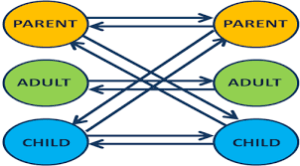The word “transactional” is often used in the world of therapy and mental health, but what does it mean? Transactional therapy is a type of psychotherapy that focuses on recognizing and altering the thoughts and behaviors that are associated with an individual’s negative self-image. The therapist invites the patient to explore his or her feelings about themselves by acting out different roles in front of them. This can be done through role-playing, writing scripts, or even reading scripts from films or books.
Contents
What is Transactional Therapy?

Transactional therapy is a type of therapy that helps people who have a bad self-image. It focuses on the thoughts and behaviors that relate to this bad self-image. The therapist invites the patient to explore his or her feelings about themselves by acting out different roles in front of them. This can be done through role-playing, writing scripts, or even reading scripts from films or books.
The goal of transactional therapy is to help patients recognize their negative thoughts and patterns of behavior so that they can work on changing them. This is a type of treatment where people are encouraged to do things themselves. They can help with their treatment.
How Does Transactional Therapy Work?

One of the main goals of transactional therapy is to help patients become more aware of their negative thoughts and patterns of behavior. This type of therapy uses different techniques like role-playing, writing scripts, or reading scripts from films or books to help people explore their feelings about themselves. Doing this can help them understand how these thoughts and behaviors are affecting them and their relationships.
Once patients have a better understanding of their negative thoughts and behaviors, the goal is for them to start working on changing them. This can be a difficult process, but with the help of a therapist, it can be done. Patients who undergo transactional therapy often find that they can improve their self-image and relationships with others.
Benefits of Transactional Therapy
There are many different benefits to undergoing transactional therapy.
- One of the main ones is that it can help people who have a bad self-image, like depression or schizophrenia.
- This type of treatment helps people to feel better about themselves and the way they act with other people. They change negative thoughts into positive ones.
- Another benefit is that this type of treatment does not require medication or other types of treatments to work effectively.
- Transactional therapy focuses on how someone thinks and behaves instead of what they are thinking or feeling at any given moment. Health care providers have changed how they give medicines to treat mental health issues. The medicines are not the first line of defense anymore. They are more effective for some disorders when they are the only option because people might not get prescribed them incorrectly.
Who Can Benefit from Transactional Therapy?

Many different people can benefit from transactional therapy.
- One type of person that could take advantage of this treatment is someone with schizophrenia or depression.
- Other kinds of people that can be helped by transactional therapy are those with anxiety disorders like post-traumatic stress disorder (PTSD) and obsessive-compulsive disorder (OCD).
- This type of treatment focuses on how people think instead of what they are thinking at any given moment.
- It helps them to recognize their negative thoughts so they can change them into positive ones, which makes them happier within themselves and in their relationships with other people.
- Transactional therapists focus on the relationship between mind, body, behavior, emotion,-image, and interpersonal relations.
This type of therapy is very helpful to people who want to focus on their relationships with other people. It changes how they see themselves and what they think about. This therapy uses different techniques like role-playing, writing scripts, or reading from scripts in books and films to help patients explore their thoughts and feelings. Doing this can help them understand the negative effects these thoughts and behaviors have on them and their relationships with others. Patients often find that they can improve their self-image after undergoing transactional therapy.
Transactional therapy helps people become more aware of their negative patterns of behavior by inviting them to act out different roles in front of the therapist. This type of therapy is used to help people explore their thoughts and feelings. They can use different techniques like role-playing, writing scripts, or reading from scripts in books and films.
Limitations Of Transactional Therapy

Although transactional therapy is a very effective way to explore thoughts and behaviors, there are some limitations.
- One of the main issues with this type of treatment is that patients often do not feel better right after. This means it can take time for them to change their negative thoughts into positive ones.
- When people go through transactional therapy, they often find that their self-image gets better. And they also may be able to make better relationships with other people too.
- Transactional therapy is not good because most therapists only treat one condition or disorder.
- People need more than one kind of treatment if they don’t want to have problems. For example, if someone has depression or schizophrenia, then they need more than one kind of treatment.
- It might be hard to treat mental health problems at once because they can affect each other.
Alternative Therapies
The role of actors in the treatment of mental health issues has been gaining attention in recent years. Transactional therapy is one approach that uses the power of acting to help people work through their problems. This type of therapy can be especially beneficial for those who have difficulty expressing themselves verbally.
In transactional therapy, the therapist and client work together to create a scenario or situation that will allow the client to express what they are feeling. The therapist may ask the client to act out different scenarios, or even just speak aloud about their feelings. This allows them to explore their emotions in a safe and controlled environment.
Therapists use therapeutic settings, as they are experts in human behavior. They can help clients to explore their feelings and emotions in a way that is both fun and informative. In transactional therapy, the use of actors can help clients to gain a better understanding of themselves and how they interact with others.
However, if you are struggling with mental health issues, consider talking to your therapist about using transactional therapy. This approach may be able to help you get on the path to recovery.
Conclusion
Transactional therapy is an approach to psychotherapy that focuses on the interactions between two people. It was developed by Dr. Eric Berne, a psychiatrist, and author of Games People Play. The goal of transactional therapy is to help both people in the transaction get what they want. They can still respect each other’s boundaries and work together. An example is when someone buys something from someone else at a garage sale. This might make the other person feel like they want to do something for this person. They might buy something back or help them with sales later on if they want more sales or favors out of this relationship. Moreover, by using transactional analysis, these types of interactions can be studied and better understood.
If you are looking for affordable Online Counseling MantraCare can help: Book a trial therapy session


